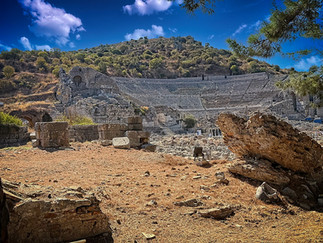At Ephesus, At Home
- Phillip Andrade
- Aug 27, 2025
- 4 min read

We are excited to be vacationing in the Mediterranean during this sabbatical. One of our stops was in Kusadasi, Turkey. This port city is the gateway to the ancient city of Ephesus, one of the most famous ruins in the ancient world. Despite only 2 to 5% of the city being excavated, significant ruins have been discovered, some of which directly relate to the Scriptures.
Part of my journey was to focus on the foundation of my personal faith and how I came to Jesus, coupled with visiting places that were foundational to the start of Christianity.
Ephesus is where the apostle John lived out his final years and wrote the epistles contained in the New Testament. This is also the church to which Paul wrote a powerful letter, though there is some debate about whether the book of Ephesians was truly written to the Ephesians. A verse from this letter has defined the core of Christianity for many:
"For it is by grace you have been saved, through faith — and this is not from yourselves, it is the gift of God — not by works, so that no one can boast." (Ephesians 2:8-9)
Even Jesus himself wrote to this church in Revelation Chapter 3, praising their perseverance yet warning them that they had forsaken their first love.
One of the places I was most excited about visiting was the great theater in the city. Historically, the Book of Acts in Chapter 19 tells us that a riot broke out at this very theater because of Paul's preaching. A silversmith named Demetrious, who made silver models of the shrine of Artemis, was losing business because the church was growing. He gathered other artisans and riled up a crowd, eventually grabbing one of Paul's traveling companions and dragging him to the theater. The riot was eventually quieted by the city’s leaders. It was here that the gospel challenged the status quo of the day.
I was disappointed that I could not actually stand in the theater because it was under reconstruction, but I did have the chance to see it and walk in other places where the apostle Paul and John most definitely would have. The main thoroughfare from the now silted-in harbor would have been a place where these men walked as they got off the ships that brought them there. The forums and agoras would have been places where they preached and taught the gospel message to those who would hear. Ancient stalls from various businesses line the edges of these agoras. It's possible Paul may have had one of the shops for his own tent-making business, though there is no record of him practicing that in this city like he did in Corinth. However, he certainly would have shopped there.
Visiting places like this is a very emotional activity for me. Of course, like most, I enjoy the history, studying the architecture, and the beauty of the place, but it's more than that. Ephesus is the starting place of my spiritual journey in many ways. Without the history that these fallen stones and monuments represent, my faith would never have come to fruition. My faith, and the faith of all Christians, is soundly rooted in history. What we believe are not made-up stories or myths developed over many years, but historical events that people witnessed and told others about contemporaneously. The apostle John knew Jesus and saw him alive after his crucifixion. Paul was radically changed by a vision of Jesus not long after. Both these men preached with boldness what they saw and experienced. Those who came to faith because of their witness to the events of historical Christianity continued to pass on that faith throughout the centuries, person to person, until eventually it came to me and I believed. Now my life has been changed, yes, of course by Jesus, but directly because of the faithfulness of these two men and others who heard their message.
This visit was very emotional for me, though I hid it from my traveling companions. Ephesus was a place where my heart cried out in thanksgiving for the sacrifices of those who came before me. I hope to have more experiences like this because I believe they are so important for me, especially as I try to renew my faith in Jesus. As I've gotten older, I have found myself becoming more cynical and jaded in how I think about the world. Like many in our affluent society, we have become so comfortable in our faith and self-sufficiency. We have come to believe that we have accomplished so much on our own, with Jesus helping a little. I have lost the discipline of thanksgiving in my life in many ways. I understand that everything I have—my possessions, my family, my life, my talents, and most importantly, my salvation—all come from Jesus. I understand, but my response often is not what it should be. The only response should be thankfulness.
I hope that someday in the future, if some archaeologist discovers the tattered remains of my home and belongings, they see more than a pile of rusted electronics, scattered Legos, and faded pictures. I hope that something remains that shows them Jesus. Something that reminds them of God’s faithfulness through the centuries. Something that might bring a tear to their eyes and cause them to be thankful to a God who still speaks among the ruins.
(The Theatre at Ephesus, The main street from the ancient harbor into the city, A view of the ancient agora)












Amen!!! What a powerful way to end such a great blog. From the rich history of the site to the spirit filled emotion and rightful attachment to the amazing "stones". Reading this I felt as though I too was there, the emotions are pouring from this excerpt and it is clear as to why.
The self reflection at the end poses a question in my heart, have I too been too focused on the wrongs and lose sight of the love. Speaking of the Epistles of John and love 1 John 4 : 7-21 is a reminder of why we have the capacity to love. From reminding us of the propitiation 1 John 4 : 10 to the greatest verse…